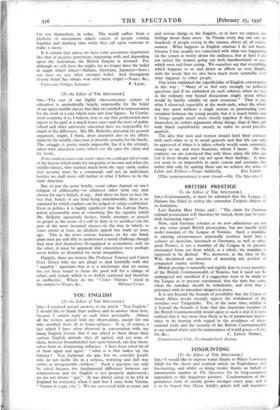[To the Editor of THE SPECTATOR.]
Snt,—The cost of our highly class-conscious system of education is undoubtedly largely responsible for the belief of our upper middle classes that they are entitled to remuneration for the work at a rate which runs into four figures. In Contin- ental countries it is, I believe, true to say that professional men expect to be paid at a much lower rate—and the costs of public school and older university education here are responsible for much of the difference. But Mr. Bellerby, pursuing his general argument, might, I think, draw attention also to the efforts made by the middle-class man to provide security for his family. The struggle is pretty nearly impossible but it is the attempt, taken with education costs, which sets the pace for salary and fee levels.
If we could re-assess our social values we could get rid of some of the factors which make for inequality of income and when the middle-classes, who learned much from the 1931 crash, realise that security must be a communal, and not an individual, burden we shall move still further in what I believe to be the right direction.
But, to put the point briefly, social values depend on one's religion or philosophy—or whatever other term one may choose for one's beliefs, if any. And there we have to face the fact that, beliefs of any kind being unfashionable, there is no standard by which conduct can be judged or values established. Even in politics it is highly significant that the Labour Party', which presumably aims at something like the equality which Mr. Bellerby apparently desires, hardly attempts to preach its gospel in the terms of a call to duty or to sacrifice—on the part of the more favoured classes—in the way in which, to some extent at least, an idealistic appeal was made 3o years ago. This is the more curious because, on the one hand, plain men are still able to understand a moral challenge though they may feel themselves ill-equipped as economists, and, on the other, it must be apparent that consciences were perhaps never before so disturbed by social inequalities.
Happily, there are writers like Professor Tawney and Canon Peter Green who are not afraid to deal faithfully with this ” equality " question—but it is a misfortune that no means has yet been found to focus the good will for a change of values and system which is so widely scattered and therefore so ineffective. Where do the " Under Thirties " stand in
















































 Previous page
Previous page